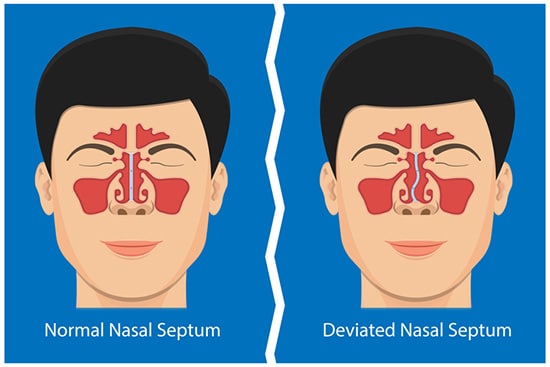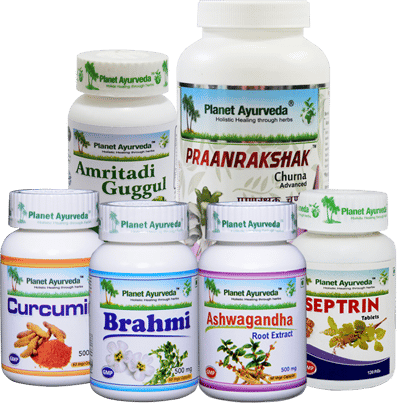Herbal Remedies for DNS (Deviated Nasal Septum)
Abstract
Deviated nasal septum is when the thin wall present between nasal passage shifts to one side. Nose is the part of the respiratory system that allows air to enter the body and filter out the debris and moistens the air. Nose provides a sense of smell and provides shape to appearance. A nose is a structure that sticks to the middle of the face and is part of the respiratory system. There are many health conditions that affect the nose are allergic rhinitis- known as hay fever causes irritation, sneezing. Deviated septum- when septum is closed either from birth or due to any injury causing breathing problems, headaches. Nasal polyp- Blocks airflow and prevents nose from filtering out. Nasal bleeding (epistaxis) – When a blood vessel in your nose breaks, it is common and is not serious. Infection- has symptoms of allergic rhinitis including sinus and common cold.

Introduction
In a deviated nasal septum the septum is the cartilage which separates the nostrils. Unevenness in the septum is the most common. It can cause health complications such as blocked nostrils and difficult breathing. Sometimes it can be congenital or can occur even after a nose injury. 80% of the people unknowingly suffer from misalignment of nasal septum. Nasal obstructive symptoms may occur due to some alteration of vestibule airflow direction. Nose plays an important role in air conditioning and air cleansing. The convex side of deviated septum shows mucosal thinning due to mechanical pressure of the spurred bone. The nasal passages are lined on sides with mucous membrane. The nasal septum is tilted towards one side which causes nasal passages to be larger than the other side. A misaligned septum interferes with drainage which increases infection and postnasal drip.
Causes Of Deviated Nasal Septum (DNS)
- Condition present at birth- It can occur when the fetus is in the womb and is apparent at birth.
- Injury to nose- Due to trauma, sports (wrestling, automobile accidents) causes nose to shift to one side and moves out of position.
- Genetic disorders such as- Marfan syndrome (Is inherited disorder affects the connective tissue, fibers that support and anchor the organs. Mostly affects the heart, eyes, blood vessels), Homocystinuria (Is an inherited disorder in which the body is unable to process certain build blocks of proteins properly).
- Fractured portions of the cartilage.
Symptoms Of Deviated Nasal Septum (DNS)
- Obstruction of one or both nostrils- This blockage makes it difficult to breath through the nostrils, more symptoms will elaborate if a person has an allergy.
- Nose bleeding- As the nasal septum becomes dry it causes risk of nose bleeding.
- Noisy breathing during sleep- Due to swelling of tissues in the nose causes noisy breathing during sleep.
- Sinus infections
- Sleep apnea (in which person stops breathing during sleep)
- Facial pain
- Whistling sounds while inhale or exhale
- Nasal blockage is more intense on one side
- Repetitive sneezing
- Mild to severe loss of smell
- Snoring
Diagnosis Of Deviated Nasal Septum (DNS)
- Physical examination
- Nasal speculum
- CT SCAN
- Fiber optic nasal endoscopy
Treatment Of Deviated Nasal Septum (DNS)
- Decongestant- They are the medication that reduces the nasal swelling and helps to keep the airway open from both sides of the nose. They are available in the form of spray and pills.
- Antihistamines- They are the medication to help prevent allergy symptoms such as stuffy and runny nose.
- Nasal steroid spray- It reduces the swelling in your nasal passage with the help of drainage. It takes 1 to 3 weeks time to reach its effect.
These medications just treat the swollen mucous membrane but it wont correct the deviated nasal spray.
Surgery
To correct the deviated septum septoplasty is done. Before and after surgery patients must avoid medications such as aspirin, stop smoking as it may increase the risk of bleeding.
Complication
- Nasal septum perforation- It is a full thickness defect of the nasal septum. It is most commonly seen along the anterior cartilaginous septum.
- Saddle nose- Due to over resection of the dorsal wall of septal cartilage.
- Septal hematoma
- External nasal deformity.
- Excessive bleeding
- Toxic shock syndrome
- Tooth and nose numbness
- Spinal fluid leak
- Other changes are change in sense of taste, smell, bruising around the eye, and visual defects.
Ayurvedic Management
In Ayurveda, DNS (Deviated Nasal Septum) is co-related with nasanaha. It is a condition where there is obstruction in the nasal cavity which causes difficulty in breathing through the nose. It is mainly associated with vitiated vata dosha which causes blockage in the nasal passage. According to acharya sushrtuta udana vayu gets enveloped by kapha dosha and its all movements are restricted and passages get obstructed. The nasal passage gets sticky and the walls seem to glue up with each other. This is known as nasanaha as there is obstruction in the nasal passages. The person feels difficulty in breathing neither moving air inside nor outside.
Treatment
- Snehapana- Oral consumption of ghee
- Shirovasti- Pouring of medicated oil over head
- Snigdha dhumpnaa- Medicated unctuous smoking
- Vata vyadhi chikitsa -(snehan, sweden, deepana pachana sneha, abhyangam, mardana, seka).
- Consumption of meat soup.
- Bala taila for external and internal usage
Herbs Used In DNS (Deviated Nasal Septum)
- Triphala- Triphala means three fruits with very powerful antioxidants, helps to calm kapha and pitta and it is beneficial in skin disease. It is used in the treatment of chronic fever. As triphala has (bibhitaki, haritaki, amalaki ) in this bibhitaki improves digestion, amalaki balances pitta dosha, haritaki is good in bowel movements. It has an anti-inflammatory property and anti histamine which stabilizes mast cells.
- Ashwagandha– It is an evergreen shrub which helps to keep calm, reduces the swelling, lower down the blood pressure.Ashwagandha increases vata and provides nourishment to the deviated septum. It is helpful in treating depression, anxiety, and is a good antioxidant that promotes strength.
- Haldi- Haldi is retarding facial growth, cures diabetes, urinary tract disease. It has anti atherosclerotic properties as it removes blocked blood vessels making the circulation easy. Haridra removes blocks created by contaminated pitta and kapha by enabling free movement of vata.
- Guggul– It has binding agent property that reduces the cholesterol level and relieves joint pain. It has an enormous effect on the musculoskeletal system, it is known for its rejuvenating property, helps in healing inflammation of fistula – anorectal. It is known for its blood thinning and clearing the channels. Relieves bad odour, skin diseases and increases the digestive disease.
Herbal Remedies For DNS (Deviated Nasal Septum) By Planet Ayurveda
Planet Ayurveda is an ayurvedic manufacturing company that makes all formulations from its natural resources. They have many branches overseas. Planet Ayurveda is a GMP certified company, all the products made are according to ancient ayurvedic texts. The products made are free from any preservatives, colors, and resins. Ingredients made are free from any adultrations. Products don’t have any side effects but provide health benefits to patients.
Products List
- Curcumin Capsules
- Septrin Tablets
- Praanrakshak Churna
- Amritadi Guggul
- Brahmi Capsules
- Ashwagandha Capsules
Dosage / Usage
- Curcumin Capsules – 1 capsule twice daily with plain water, after meals.
- Septrin Tablets – 2 tablets twice daily with plain water, after meals.
- Praanrakshak Churna – 1/2 tsp. twice daily with Ginger Swaras, after meals.
- Amritadi Guggul – 2 tablets twice daily with lukewarm water, after meals.
- Brahmi Capsules – 1 capsule twice daily with plain water, after meals.
- Ashwagandha Capsules – 1 capsule twice daily with plain water, after meals.
Products Description
1. Curcumin Capsules
Curcumin is a single herbal capsule which is formulated by Planet Ayurveda using a single extract of Haridra (Curcuma longa). It has anti-inflammatory properties as in DNS there is swelling in the lining of the nasal cavity so haridra helps to reduce the inflammation. It is very helpful in atherosclerosis which is due to accumulation in blood vessels (accumulated are kapha and meda). Haridra helps to break down the accumulation and clears the channels.
2. Septrin Tablets
Septrin Tablets are formulated by Planet Ayurveda in the form of tablet using ingredients like Guggul (Commiphora mukul), Tulsi (Ocimum sanctum), Sonth (Zingiber officinale), Haldi (Curcuma longa) and more. It is helpful in patients to relieve upper respiratory tract disorders. It is very effective in treating infections. Balances tridosha (vata, pitta, kapha doshas).
3. Praanrakshak Churna
It is polyherbal chooran formulated by Planet Ayurveda using ingredients like- Shirish (Albizia lebbeck), Bharangi (Clerodendrum serratum), Mulethi (Glycyrrhiza glabra), Dalchini (Cinnamomomum zeylanica) and many more. It is effective for patients suffering from asthma, relieving cough, bronchitis. It works as an anti-bacterial antibiotic capable of treating throat related infections.
4. Amritadi Guggul
They are herbal tablets formulated by Planet Ayurveda using ingredients like – Guduchi (Tinospora cordifolia), Guggul (Commiphora mukul), Haritaki (Terminalia chebula) and more. Are antiinflammatory so helpful in deviated nasal septum, helpful in treating diabetes cures rheumatoid arthritis. It acts as a cleanser of the bladder, and in stiffness of the joint.
5. Brahmi Capsules
These capsules are formulated by Planet Ayurveda using standardized extract of Brahmi (Bacopa monnieri). It improves breathing power by relaxing the muscles, enhances muscles. Improves constipation, digestive power. Useful in irregular menstruation, impotence, premature ejaculation.
6. Ashwagandha Capsules
This is a single herbal capsule formulated by Planet Ayurveda using a single extract of Ashwagandha (Withania somnifera). It is effective in increasing stamina of the body and increases vata dosha and provides nourishment to the nasal cavity, enhances stamina and is used as a nerve tonic.
Conclusion
DNS (Deviated Nasal Septum) is when the thin wall present between nasal passages shifts to one side. A misaligned septum interferes with drainage which increases infection and postnasal drip. It is mainly associated with vitiated vata dosha which causes blockage in the nasal passage. There are many herbal remedies by Planet Ayurveda which provide great relief to patients without any side effects.




